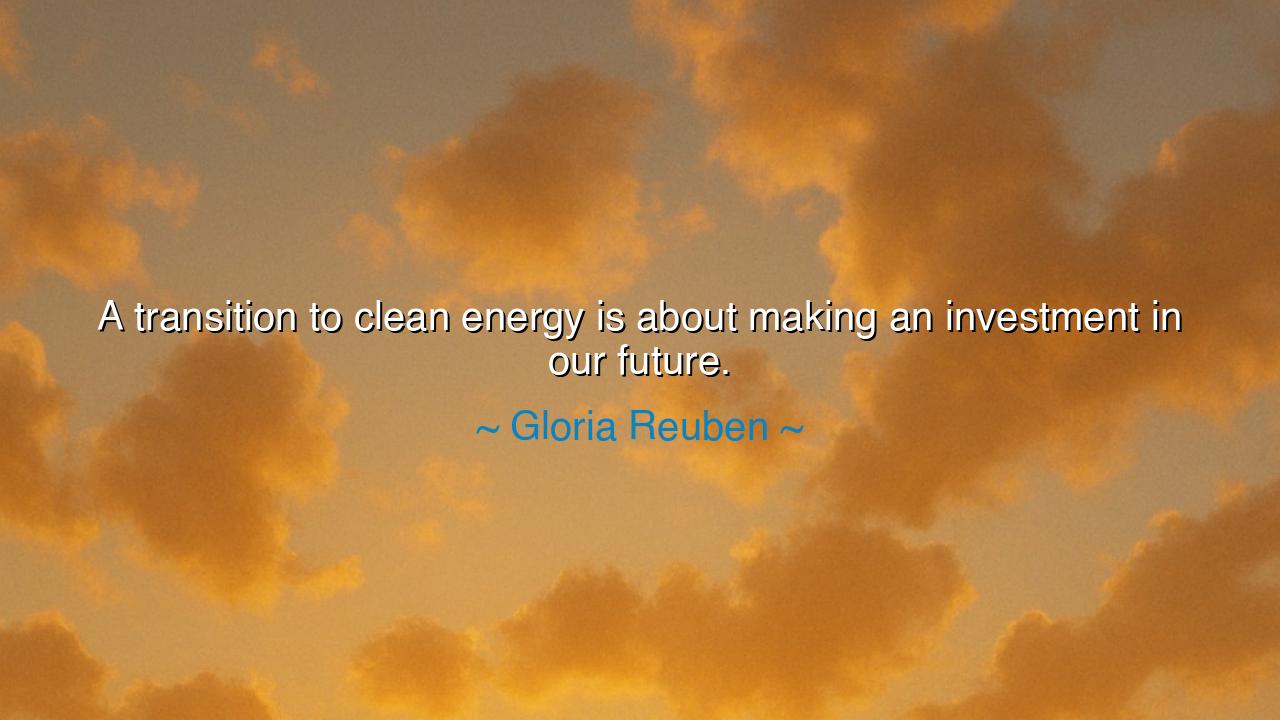
A transition to clean energy is about making an investment in our






In the words of Gloria Reuben, “A transition to clean energy is about making an investment in our future,” we are reminded of a fundamental truth that spans beyond the realm of energy and touches the very essence of what it means to be human: the choices we make today shape the world of tomorrow. Reuben speaks to the importance of visionary thinking, recognizing that the decisions we make regarding our environment and energy today are not just about addressing the needs of the present moment, but about ensuring the wellbeing and prosperity of future generations. Just as ancient civilizations understood the need to build foundations for future growth, so too must we embrace the task of ensuring that the resources we use today will not be depleted but preserved for the future.
This notion of investment in the future has been a guiding principle for many of history's greatest leaders. The Greeks, particularly in the time of Pericles, believed in building a society that not only thrived in their time but would endure for generations. Pericles' vision for Athens involved massive investments in infrastructure, culture, and education. He understood that the strength of his city-state was not in its conquests, but in its wisdom and sustainability—building a civilization that would stand the test of time. This forward-thinking approach, rooted in the belief that the present should always serve the needs of the future, echoes Reuben’s call to shift toward clean energy—not as a luxury or short-term solution, but as a profound investment in the enduring health of the planet and the generations that will inherit it.
Similarly, Marcus Aurelius, the Stoic philosopher-emperor, also understood the importance of acting with future generations in mind. His leadership was marked by his commitment to creating a world where the virtues of justice, wisdom, and fortitude would guide the actions of those who followed. Like Pericles, Marcus was concerned not just with the present, but with laying the foundation for a better world. His reflections in Meditations are a call to action for each of us to live with an awareness of the impact our choices have on those who come after us. The clean energy transition that Gloria Reuben speaks of mirrors this ancient wisdom: to ensure that our decisions today do not only serve our immediate needs, but also the needs of a world yet to come.
The story of Thomas Edison, the inventor of the lightbulb, offers a striking example of someone who made an investment in the future, believing in the transformative power of technology to better the lives of humanity. Edison was not simply driven by the desire to create something that worked; he sought to create a revolutionary technology that would change the way people lived for generations. His work is a reminder that innovation—when done with the future in mind—can lay the groundwork for long-term progress. Similarly, the push for clean energy is not just about solving problems for the present, but about harnessing innovation to ensure that future generations inherit a world that is sustainable, resilient, and vibrant.
Reuben’s statement is a call to action that resonates deeply with the challenges of the modern world. As we face the consequences of unchecked industrialization, pollution, and the rapid depletion of natural resources, we are confronted with the urgent need to shift toward sustainable energy sources. Like Edison’s invention of the lightbulb, the shift to clean energy is not merely a technical solution, but an opportunity to create a world where future generations can live in harmony with nature. It is an investment in the health of our planet, a recognition that the world we leave behind must not be one of scarcity, but of abundance, built on the principles of sustainability and responsibility.
The lesson in Gloria Reuben’s words is both a practical one and a moral one. The future is not a distant thing—it is being shaped by every choice we make today. Whether it’s in our individual decisions to reduce waste, or in the broader collective movement toward clean energy, each action we take is an investment in the world we want to leave for future generations. Just as Marcus Aurelius and Pericles made choices that would ensure the survival of their civilizations, so too must we make the choices that will secure the wellbeing of our planet.
In practical terms, we can begin by looking at how we live and work, considering how our actions today will impact the world tomorrow. Are we making sustainable choices in our energy use, our consumption, and our production methods? Do we support green technologies and policies that promote renewable energy? The transition to clean energy is not something that can be left to future generations alone—it is a responsibility that belongs to all of us. Let us embrace this moment, knowing that the choices we make today will determine the future that we and our children will inherit. By investing in clean energy, we are not just securing a future for ourselves; we are ensuring a legacy of health, abundance, and sustainability for all who follow.






AAdministratorAdministrator
Welcome, honored guests. Please leave a comment, we will respond soon